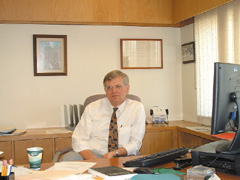Although many on campus may not know who the new provost is or what he does, they may rest assured that the highest position under chancellor Gora is in very capable hands. Most recently Dr. Paul J. Fonteyn was dean of graduate studies, a professor of biology and associate vice president for research and sponsored programs, where he raised the extramural awards from $12 to $42 million in 11 years, at San Francisco State University.
Having officially taken up his position at UMass Boston on August 19, Provost Paul Fonteyn, head of faculty and vice chancellor of academic affairs, is busy getting to know his staff. “I want to know people professionally and personally and I am focusing on three different approaches,” says Dr. Fonteyn. “Every two weeks, I am offering an hour and a half open-door period for faculty or students to meet with me. Once a month, I also plan on holding informal mixers in my office and inviting a cross-section of faculty to attend. The only criterion is that business isn’t to be discussed. In the meantime, I am meeting with every department as soon as possible.”
Over the issue of 74 UMass professors leaving last semester due to early retirement incentives, Dr. Fonteyn was sorry to see them go, but optimistic about the future staff. “We lost a lot of really neat people, but it’s not unique,” said the provost. “We want to maintain a vibrant mix of some senior leadership with young people coming in and out, bringing new ideas.” He feels that vibrant mix will not be difficult to achieve in a city like Boston, which is home to so many universities and academia.
Beyond campus issues, Dr. Fonteyn brings an enormous gift to Boston’s community, his National Science Foundation (NSF) grant, and what seems like UMass’s opportunity to follow through on its vision of being a positive force in the region.
Over 10 years ago Fonteyn joined Dan Sudran, who at the time was a technician at San Francisco City College, to build a Community Science Workshop (CSW). It was designed to give youth aged around 8-15 years, from poor and at-risk communities a chance to grow through experiencing science hands on.
The NSF grant originally funded the creation of the Mission Science workshop in San Francisco, the success of which led Dr. Fonteyn to author a $3 million grant. That money was used to established sites all over the state of California, sites which soon became self-supporting through community partnerships. In addition, satellite workshops opened up as parents and teachers realized their value.
Dr. Fonteyn felt that, “If the centers can succeed [in California], they can succeed in just about any American neighborhood.” And went on to get another $3 million of funding to prove just that. Eight sites were launched in cities including Tucson, Miami, Houston, New Orleans, Detroit, Seattle, New York and Washington, D.C. With Boston next on the list, they’re still coming.
“The sites will serve as ‘hubs’ for developing spin off sites,” said Dr. Fonteyn, “like a main city library that has neighborhood branches. The CSW’s in any region share resources, but each one will reflect the cultural needs of their communities.”
The program targets minority communities and there is an emphasis on creating an environment to reflect the culture of the children that attend. The staff is bilingual, they teach, supervise and answer questions but overall, children are left to themselves to work on projects of their interest.
In the past, nearby schools have greatly benefited from the resources and expertise of their local CSW staff. Workshops have interactive exhibits, resident animals, hands-on experiments and workspace in which to “tinker” with all manner of tools.
A study in January 2000 by the Inverness Research Associates, showed that Hispanic youth made up 61% of those who frequented the workshops, African Americans made up 19%, Asians 10%, white 6% and Native American 4%. Ninety-five percent came from low income families and up to 37% were at risk of entering the juvenile justice system.
Nearly half the participants were girls, which Dr. Fonteyn describes as another focus of the program, because girls are often culturally discouraged to build or take things apart with their hands.
Although the project has not yet been extended to Boston, Dr. Fonteyn is currently planning and considering suitable locations and administrators.

